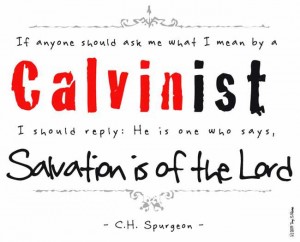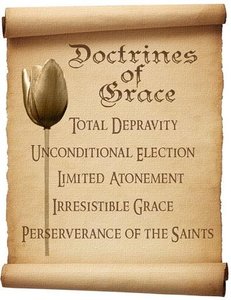I very much appreciated the way Pastor Jim McClarty responded to some questions in an article he posed entitled “Sovereignty, Puppetry,
Recently I have been watching your videos on YouTube of your messages and sermons about the Sovereignty of God, Calvinism, predestination, and Reformed Theology.
I am greatly encouraged by the messages but still confused because of how I was raised. People in the church I attended said Calvinists do not evangelize and they [Calvinists] think people are robots with no free will to love God.
So here are my questions:
1. Are all events on earth already preordained by God?
2. Do we have a “free will?”
3. Are we robots already programmed?
4. How does the aspect of love play into this if we are just puppets?
Reply:
 I understand your perplexity. It takes time to sort through the things you’ve been taught and separate traditions from valid doctrines. One of the most difficult aspects of learning and embracing what the Bible actually says is un-learning our traditions, assumptions, and presuppositions.
I understand your perplexity. It takes time to sort through the things you’ve been taught and separate traditions from valid doctrines. One of the most difficult aspects of learning and embracing what the Bible actually says is un-learning our traditions, assumptions, and presuppositions.
The things that you’ve written here are typical responses to Calvinism. For instance, people who do not know their church history will often claim that Calvinism inhibits evangelism. But nothing could be further from the truth. The fact is, some of the greatest revivals in history were led by Calvinists. The first universities planted on U.S. soil were established by Calvinists. Some of the most enduring missionary societies were established by Calvinists. So, the claim that Calvinists do not evangelize is mere folly.
The following bit of history is from my book By Grace Alone (which is available as a free pdf download on the GCA website), including a pericope from David Steinmetz’s book Calvin in Context.
Calvinism, as it is commonly called, has a rich European history, but it finds its most striking influence during the foundation of these United States. Owing to Martin Luther’s commitment to reform, the church that bears his name was founded on the teaching of God’s election and determinate predestination. John Knox, the founder of the Presbyterian Church, held these doctrines. Early American history reveals that the vast majority of the Pilgrims who landed at Plymouth Rock were Calvinistic Presbyterians. The Congregationalist Churches of early America were once bound by these doctrines. And the original Baptists were avid predestinarians, which is why their modern counterparts advertise themselves as “Free-Will Baptists” to distinguish themselves from their ancestors.
This English Calvinist strain was strengthened by the Dutch Calvinists of New York and New Jersey, the German Reformed of Pennsylvania and Maryland, and the Scots-Irish Presbyterians who settled in the mid-Atlantic and southern colonies.While not all settlers in the New World were Protestant and not all Protestants were Calvinist, nevertheless there was from the very beginning a strongly Calvinist influence on American thought and institutions. Calvinists founded universities, pioneered the New England town meeting, insisted on the separation of powers in the federal government, played a prominent role in the movement for the abolition of slavery, and even promoted such characteristic institutions of frontier revivalism as ‘the anxious bench’ and the ‘camp-meeting’… In short, although Calvinism is not the only ingredient in American intellectual and religious history, it is such an important ingredient that no one can claim to understand American history and culture without some appreciation of its Calvinist heritage.
Or, let’s look at it this way: Calvinistic theology is drawn directly from biblical, Pauline doctrine. Of all the New Testament writers, Paul wrote the most complete arguments in favor of God’s absolute predestination and electing grace. Yet, Paul devoted his life, his wealth, his health, and everything in him to the work of evangelism. Calvinists follow Paul’s example. We teach everything that the Bible says and we do everything that the Bible instructs. We evangelize vigorously because we do not know who God’s elect are. And in reality, Calvinism inspires evangelism because we know that God’s word will not return to Him void; it will accomplish what God intends for it to accomplish. Continue reading

 I speak for many when I say that I have not always embraced the doctrines of grace or what is commonly called Calvinism. Its actually unfortunate that a man’s name is associated with the doctrines that came out of the Protestant Reformation. Calvin was not the first to articulate these truths, but merely was the chief systematizer of such doctrines. There was actually nothing in Calvin that was not first seen in Luther, and much of Luther was first found in Augustine. Luther was an Augustinian monk, of course. We would also naturally affirm that there was nothing in any of these men that was not first found in Paul and Peter and John in the New Testament.
I speak for many when I say that I have not always embraced the doctrines of grace or what is commonly called Calvinism. Its actually unfortunate that a man’s name is associated with the doctrines that came out of the Protestant Reformation. Calvin was not the first to articulate these truths, but merely was the chief systematizer of such doctrines. There was actually nothing in Calvin that was not first seen in Luther, and much of Luther was first found in Augustine. Luther was an Augustinian monk, of course. We would also naturally affirm that there was nothing in any of these men that was not first found in Paul and Peter and John in the New Testament. Arminius moved to Amsterdam to pastor a prominent church there. As a pastor, he was called upon to defend Calvinistic teaching against Dirck zoon Koornheert. In preparing his defense of traditional Calvinist doctrine, Arminius became convinced of his opponent’s teaching.
Arminius moved to Amsterdam to pastor a prominent church there. As a pastor, he was called upon to defend Calvinistic teaching against Dirck zoon Koornheert. In preparing his defense of traditional Calvinist doctrine, Arminius became convinced of his opponent’s teaching. Question: If Christ actually “saved” the elect on the cross, isn’t it true to say that the elect are born already justified and there is no need to exercise faith?
Question: If Christ actually “saved” the elect on the cross, isn’t it true to say that the elect are born already justified and there is no need to exercise faith? “There is no soul living who holds more firmly to the doctrines of grace than I do, and if any man asks me whether I am ashamed to be called a Calvinist, I answer – I wish to be called nothing but a Christian; but if you ask me, do I hold the doctrinal views which were held by John Calvin, I reply, I do in the main hold them, and rejoice to avow it.” (C. H. Spurgeon, a Defense of Calvinism)
“There is no soul living who holds more firmly to the doctrines of grace than I do, and if any man asks me whether I am ashamed to be called a Calvinist, I answer – I wish to be called nothing but a Christian; but if you ask me, do I hold the doctrinal views which were held by John Calvin, I reply, I do in the main hold them, and rejoice to avow it.” (C. H. Spurgeon, a Defense of Calvinism) God’s control is absolute in the sense that men do only that which He has ordained that they should do; yet they are truly free agents in the sense that their decisions are their own, and they are morally responsible for them. It’s hard to grasp that mentally. Actually it blows our minds. Yet these two things are taught constantly in the Bible: (1) God is totally Sovereign and (2) man is totally responsible.
God’s control is absolute in the sense that men do only that which He has ordained that they should do; yet they are truly free agents in the sense that their decisions are their own, and they are morally responsible for them. It’s hard to grasp that mentally. Actually it blows our minds. Yet these two things are taught constantly in the Bible: (1) God is totally Sovereign and (2) man is totally responsible. This is a repost but something we should all be reminded of:
This is a repost but something we should all be reminded of: